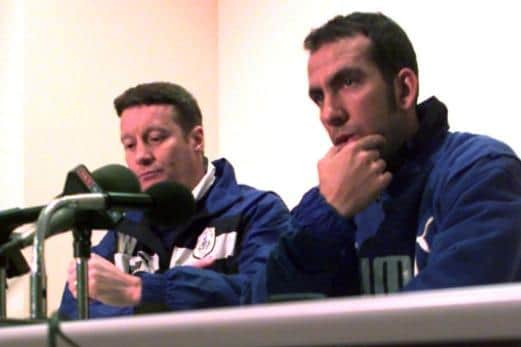‘Pathetic..’ ‘Regrets..’ Sheffield Wednesday icon Danny Wilson reveals all on Paolo Di Canio exit debacle
and live on Freeview channel 276
And now former Danny Wilson has opened up for the first time on the decisions that led to maverick Italian Paolo Di Canio leaving Hillsborough nearly 24 years ago.
Owls icon Wilson, who played over 100 times for the club and was one of the star men in a halcyon early-1990s era in which he won the Rumbelows Cup and reached both domestic cup finals two years later, was Wednesday manager when all hell broke loose on September 26 1998.
Advertisement
Hide AdAdvertisement
Hide AdA melee, a swinging Martin Keown elbow, red mist and red cards. And then the world stopped with a push, by Di Canio on referee Paul Alcock.


It was his last action in a Wednesday shirt. A heavy-set 11-match ban and three months later he was a West Ham United player, with Wednesday having received a fee of only £1.5m.
Some see the debacle as one of many factors in a late-90s downward spiral the club are in many ways still paying for – with chairman of the time Dave Richards laying blame at Di Canio’s door and claiming the sales of him and countryman Benito Carbone ‘killed’ the club.
Speaking to The Star amid the promotion of his excellent tell-all autobiography ‘I Get Knocked Down’, Wilson offered his view from the manager’s office on how things transpired as the whirlwind of media scrutiny whipped matters into national scandal and the decision was made to sell Di Canio.
Advertisement
Hide AdAdvertisement
Hide AdDi Canio has spoken a handful of times about his Owls exit and was critical of how the club handled it, years later apologising for cruelly describing Wilson as a ‘frustrated nobody’ in a 2000 autobiography of his own.
“Of course I have regrets,” Wilson said, detailing how Di Canio had refused or felt unable to return to England in the weeks after the push. “We didn’t continue with a top, top player as we would’ve wanted.
“He was sold at a very poor price in my opinion off the back of everything that happened before that. There’s one thing that will never go away and that’s the reason he was sent off, for putting his hands on the referee.
“It was pathetic the way the referee went down, I’ll say that, but at the same time it did happen and you can’t do that.
Advertisement
Hide AdAdvertisement
Hide Ad“I thought the punishment [an 11-game ban] was very harsh but that led to one or two things that were out of our hands. We couldn’t get him back in the country, he had medical records as to why he couldn’t come back in, that he was in distress and under pressure in that respect. We couldn’t force him to come back.
“Of course we could have handled it better. I could have handled it better, the club could have handled it better, Paolo could have handled it better.
“As a group of people that were involved in the situation as it developed, we could have done things differently.”
Wednesday had paid in the region of £3m to sign Di Canio from Celtic a little over a year before his switch to West Ham, where he went on to become a Premier League icon.
Advertisement
Hide AdAdvertisement
Hide AdOnce the decision was made to sell the forward, moving him on wasn’t necessarily an easy task given the carnival of controversy that followed him.
With few willing participants in a bidding war and claims there had been an agreement among Premier League chairman not to pursue Di Canio’s signing, a fee was negotiated in the Wednesday board room well above Wilson’s head.
It was a rock-bottom sum of money the now 62-year-old can’t quite get his head around to this day – alongside the fact he ended up at West Ham. In the Premier League.
“The situation with Paolo [not returning to England] was part of the decision that was made,” he said. “One thing that was ridiculous was the fee, but it was felt clubs in the Premier League wouldn’t touch him because of what had happened.
Advertisement
Hide AdAdvertisement
Hide Ad“It should have been a deal in the region of £5m or £8m. West Ham got a bargain there and he obviously went on to do very well for him.”
Despite swipes by Di Canio through the media in the past – either direct or indirect – Wilson has always preferred to keep his counsel over the fracas, until now.
Wilson’s Sheffield United side played out a goalless draw against the Italian’s Swindon in November 2012 and both parties have since gone on record to maintain in the strongest possible terms that the matter is water under the bridge between them.
“It’s football,” Wilson said. “It’s management. Take a look at Paolo’s career now, he’s in management and he will tell you how it is.
Advertisement
Hide AdAdvertisement
Hide Ad“You don’t always get things right, you may well have a fall-out with people, but it’s never for too long. The older you get, the more you understand these things happen and you put things to one side.
“This is the first time I’ve spoken about it and that’s solely because the book is out and people want to talk about it.
“In an ideal world I wouldn’t talk about it because it’s gone, it’s history and nothing can change what happened.
“If I could have changed it, yes I possibly would have.”
This story and others are told in much more detail in Danny Wilson’s autobiography ‘I Get Knocked Down’ – available in all the usual places.